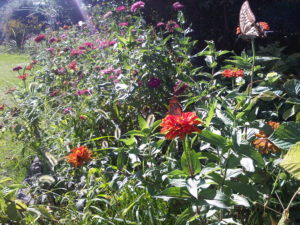The film offers a new way to think about nature and ecology
“One Life” produced by BBC Earth
NATURE is great. Many people think so. If you watch this film, it makes the idea stronger. At a time when the relationship between nature and humans has been reconsidered, One Life offers a new perspective on environmental and ecological issues.
The film starts with a question: What is life? To eat, to feed and protect a family. In short, it is to survive, the film says. Then, a family of seals appears on the screen. The mother shields her baby against a heavy storm. The film presents six stories featuring various creatures from reptilian, insects, birds and primates.
From this film we can understand that animals and insects are the same as humans. But that is not all. The film contains more beautiful pictures than any other wildlife documentary films. They show not only how smart those creatures are, but also some of them are even smarter than humans. Take bottlenose dolphines. They use mud as a trick to get fish to eat. That is just amazing. And it is staggering to see basilisk running on water.
Animals, insects and plants are all living desperately, but the way they die also sticks in my mind. While Komodo dragons bite a buffalo to poison the animal, which continues until it dies, the eyes of the buffalo look as if it realised something is going on. Meanwhile, an octopus spawns in the sea. Seeing her babies going out into the world, she is quieltly dying. It is a pitiful but beautiful sight. I wonder if this is what returning to nature after death means.
The film is produced by BBC Earth and is their sixth in a series of documentaries about nature. Without cutting-edge technologies and high budget, they could not shoot and show beautiful pictures. Behind it lies the British spirit of explorer. Japan does rarely produce wildlife documentary films like One Life. There are many television documentaries on the subject, but not so in the theatre. Now, because of the budget deficit of the British government, BBC’s budget has been cut. This film, however, shows its doggedness and pride as a leader in the media.
The co-director, Martha Holmes, studied at Bristol University. BBC Natural History Unit, which produces this series, locates their headquter in this city. There seems to be a link between me and them for I used to live there as a student of the same university as her.
Perhaps, even though it is neither visible nor tangible, all creatures are connected, that is, a sense of oneness with the natural world. Basically, humans and other creatures have the same thought, which proves that idea. Few other films provide this fresh and important perspective on environmental and ecological issues better than One Life. It should be high on your list of film.

Ryo Kubota is a staff writer at Transpheric Management in Tokyo as well as a freelance writer. He has covered Sports for the Nippon Newspaper Company in Tokyo and teaches at a private tutoring school in Iruma, Japan. Having studied in both Tokyo and England in the areas of sociology, he has a keen interest in the world at large.









